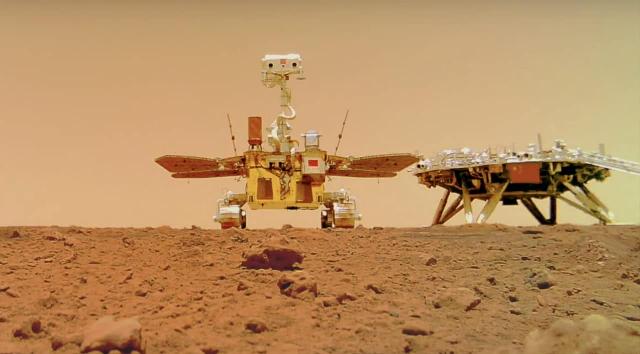The Chinese Space Agency has published an open appeal to all potential international partners with a proposal to deliver their scientific instruments to near-Martian orbit as part of the Tianwen-3 mission. China is under Western sanctions in the field of space cooperation, so it is very important and difficult for the Chinese to find partners from abroad. It is the Tianwen-3 mission that is highly likely to be the first to deliver Martian soil back to Earth.
Studying the soil of other celestial bodies "on the spot" inevitably has very limited effectiveness. Planetary rovers are not capable of carrying really heavy or energy-consuming equipment, because their payload is small, and the stable power supply does not exceed 110 watts. It was the delivery of regolith from the Moon in the 1960s that led to a revolution in the study of the Earth's satellite and the emergence of a new theory of its formation.
Unfortunately, it is very difficult to achieve this with Mars: you need to spend a lot more fuel to travel there. So far, no one has done this yet. The Chinese National Space Administration (CNSA) intends to fill this gap with the Tianwen-3 mission launched on two Changzheng-5 heavy rockets.
It will consist of a Mars satellite (in an elliptical orbit of 400 by 76 thousand kilometers), a small cargo ship for ground recovery (in a circular orbit of 350 kilometers) and a lander. He will land on the surface of the planet, take a sample from a shallow depth using a drill and, presumably, from the surface using a rover. In a few months, a small launch stage will take them into orbit, into a return vehicle. It will deliver the soil to the Ground. The launch is scheduled for 2028, and the return is scheduled for 2030.
On March 11, 2025, the office posted a document on its website inviting all potential international partners to send a payload from Tianwen-3. It can work in a mission only from orbit, and not from the surface (there are very strict weight restrictions for the lander).
There are other significant limitations to such a "passing load". Instruments for a ship returning to Earth must have a mass of no more than 15 kilograms. For an artificial satellite of Mars, the limit is even lower: the mass is no more than five kilograms. The electrical power of both sets of associated loads is not more than 40 watts. The dimensions of each additional device may not exceed 300 by 200 by 200 millimeters.
The selection of potential associated loads will take place in June-October 2025. It is still unclear who exactly will decide to participate in the mission. But the most likely candidates are third world countries that are not in the orbit of Western influence. The rest will be stopped by the threat of sanctions, which Western states consistently threaten any players trying to cooperate with China in space.
Despite the sanctions, it is highly likely that China will be the first to return soil from Mars. This is very important because NASA deliberately avoids searching for modern life on the Red Planet, and China has no such restrictions. Moreover, in the document posted by the department, the search for "traces of life on Mars" is designated as the most important goal. At the same time, few specifics are known about the composition of the devices that will search for it.
In general, the United States is significantly ahead of China in space capabilities in the 2020s: China does not yet have a single superheavy rocket, while the United States has one flying (Falcon Heavy), and the second is being brought (Starship). But specifically in terms of delivering soil to Earth, this advantage will not help in the 2020s: Starship is too massive to take off from the fourth planet without human intervention. And the Americans are not developing miniature returnable steps, and it is not very realistic to do this before 2028. In general, the level of Chinese missions to Mars is very serious: if the USSR failed to make a completely soft landing for any Mars rover (and Russia did not even try), then the Chinese succeeded with the rover four years ago on the first attempt.

